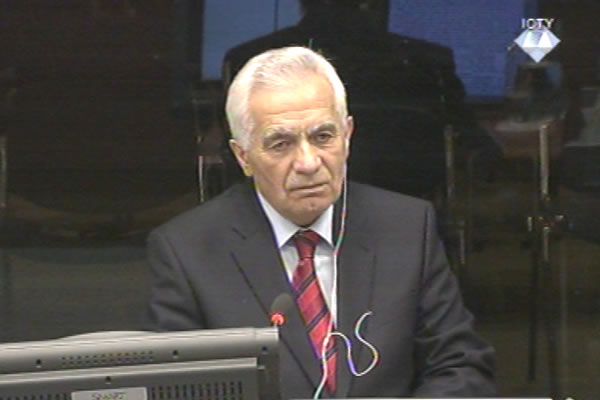Home
KRAJISNIK’S DEMOCRATIC ASSEMBLY
The prosecution alleges that the Republika Srpska Assembly was an instrument used to implement the criminal policy designed by the Serb leadership, headed by Karadzic; Karadzic’s defense witness Krajisnik, who was the speaker of the Assembly, said it could serve as a model for the most democratic of countries
 Momcilo Krajisnik, witness at the Radovan Karadzic trial
Momcilo Krajisnik, witness at the Radovan Karadzic trial Former speaker of the Republika Srpska Assembly Momcilo Krajisnik tried hard to present the Assembly in the best possible light as he testified in Karadzic’s defense today. He tried to convince the Trial Chamber that during the war the system was based on democratic principles: it was not run by Krajisnik or Karadzic as authoritarian rulers, as the prosecution alleges. Krajisnik wants to exonerate himself and the accused of the crimes against Muslims and Croats in the territories under the Serb control. Karadzic is on trial for those crimes, while Krajisnik has served two thirds of his 20-year sentence and has recently been granted early release.
In its pre-trial brief, the prosecution alleged that the Assembly had been a minion and an instrument of the central government headed by Krajisnik and Karadzic. As such, the Assembly was a ‘centralized forum for the promulgation of the policies’ designed by the leadership and for the implementation of those policies at a local level. Krajisnik contradicted this claim in no uncertain terms, describing the Assembly as a democratic institution where sessions went on ‘forever’ in a bid to find the best solution. Proposals were passed on unanimously thanks to lengthy and well-argumented discussions, Krajisnik claimed, not because the Assembly did nothing but rubberstamp the decision made by the Serbian Democratic Party leadership, as the prosecution alleges.
The witness denied the prosecution’s claim that during the war in BH he and the accused held the ‘highest position in the decision making process and control of the government’ among the Bosnian Serbs. As Krajisnik said, ‘kings did not have such powers’ in the past, and neither did he and Karadzic. People love leaders and ‘fetishize’ their role, Krajisnik said, explaining why the kind of power they didn’t have was attributed to them.
Commenting on the prosecution’s claim that Karadzic and his associates wanted an ‘ethnically pure’ Republika Srpska, the witness said that it was a matter of linguistic misunderstanding. The word ‘pure’ was used by the people in BH to designate territories where one of the three ethnic communities had a majority. For example, it was said that Drvar, Grahovo, Glamoc, where Serbs had a 70 to 90 percent majority, were ‘purely Serb’ towns. That, in Krajisnik’s view, didn’t mean that the other minorities should be expelled. The prosecution on the other hand contends that the Bosnian Serb leadership actually aspired to the ideal: a 100 percent majority in the territory under their control.
In his defense of Karadzic and in his own defense against the allegations that the local Bosnian Serb civilian authorities organized the expulsion of Muslim and Croat civilians, the witness explained that this was done to comply with the agreements concluded with the Red Cross and other international organizations. According to the agreements, the people who belonged to ethnic minorities were supposed to be given assistance if they wanted to seek shelter in places where they felt safe, Krajisnik explained. According to Krajisnik, it was a temporary measure, and they were given guarantees that they would be able to return as soon as possible.
Momcilo Krajisnik’s examination-in-chief was completed today. The cross-examination is expected to commence next week, after the court hears the evidence of four defense witnesses. The first of them, former deputy warden of the Trnopolje prison camp Slavko Puhalic, began his evidence today.
Linked Reports
- Case : Karadzic
- 2013-11-12 KRAJISNIK NOW DENIES RESPONSIBILITY HE HAD (PURPORTEDLY) ACCEPTED
- 2013-11-07 MOMCILO AND RADOVAN DRAW MAPS, YET AGAIN
- 2013-11-06 WAR CRIMINAL OR ‘INNOCENT OBSERVER’
- 2013-11-14 WHY DID KARADZIC TOLERATE BRDJANIN’S ‘IDIOTIC’ ACTIONS?
- 2013-11-15 WAS KARADZIC ‘AGGRESSIVE’ OR ‘VIOLENT’?
- 2013-11-18 BRDJANIN SORRY HE COULD NOT BE TRIED ON ‘NEW STANDARDS’
